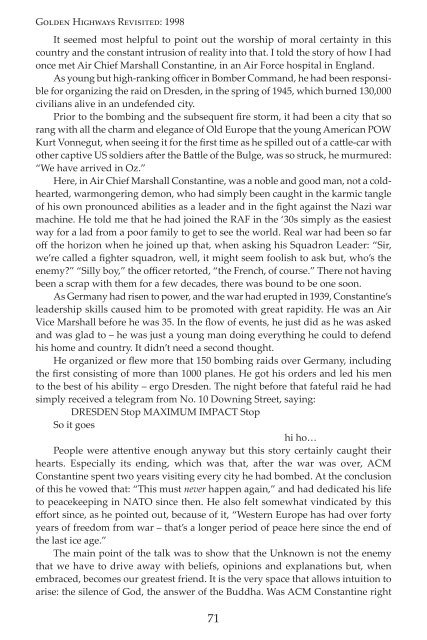Rugged Interdependency - Amaravati Buddhist Monastery
Rugged Interdependency - Amaravati Buddhist Monastery
Rugged Interdependency - Amaravati Buddhist Monastery
- No tags were found...
Create successful ePaper yourself
Turn your PDF publications into a flip-book with our unique Google optimized e-Paper software.
Golden Highways Revisited: 1998It seemed most helpful to point out the worship of moral certainty in thiscountry and the constant intrusion of reality into that. I told the story of how I hadonce met Air Chief Marshall Constantine, in an Air Force hospital in England.As young but high-ranking officer in Bomber Command, he had been responsiblefor organizing the raid on Dresden, in the spring of 1945, which burned 130,000civilians alive in an undefended city.Prior to the bombing and the subsequent fire storm, it had been a city that sorang with all the charm and elegance of Old Europe that the young American POWKurt Vonnegut, when seeing it for the first time as he spilled out of a cattle-car withother captive US soldiers after the Battle of the Bulge, was so struck, he murmured:“We have arrived in Oz.”Here, in Air Chief Marshall Constantine, was a noble and good man, not a coldhearted,warmongering demon, who had simply been caught in the karmic tangleof his own pronounced abilities as a leader and in the fight against the Nazi warmachine. He told me that he had joined the RAF in the ‘30s simply as the easiestway for a lad from a poor family to get to see the world. Real war had been so faroff the horizon when he joined up that, when asking his Squadron Leader: “Sir,we’re called a fighter squadron, well, it might seem foolish to ask but, who’s theenemy?” “Silly boy,” the officer retorted, “the French, of course.” There not havingbeen a scrap with them for a few decades, there was bound to be one soon.As Germany had risen to power, and the war had erupted in 1939, Constantine’sleadership skills caused him to be promoted with great rapidity. He was an AirVice Marshall before he was 35. In the flow of events, he just did as he was askedand was glad to – he was just a young man doing everything he could to defendhis home and country. It didn’t need a second thought.He organized or flew more that 150 bombing raids over Germany, includingthe first consisting of more than 1000 planes. He got his orders and led his mento the best of his ability – ergo Dresden. The night before that fateful raid he hadsimply received a telegram from No. 10 Downing Street, saying:DRESDEN Stop MAXIMUM IMPACT StopSo it goeshi ho…People were attentive enough anyway but this story certainly caught theirhearts. Especially its ending, which was that, after the war was over, ACMConstantine spent two years visiting every city he had bombed. At the conclusionof this he vowed that: “This must never happen again,” and had dedicated his lifeto peacekeeping in NATO since then. He also felt somewhat vindicated by thiseffort since, as he pointed out, because of it, “Western Europe has had over fortyyears of freedom from war – that’s a longer period of peace here since the end ofthe last ice age.”The main point of the talk was to show that the Unknown is not the enemythat we have to drive away with beliefs, opinions and explanations but, whenembraced, becomes our greatest friend. It is the very space that allows intuition toarise: the silence of God, the answer of the Buddha. Was ACM Constantine right71
















